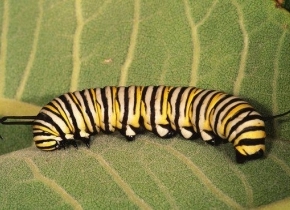

乳草生长过程中空气里二氧化碳的含量越高,其毒素含量就越低,而这毒素正是帝王蝶抵抗肠道寄生虫所必需的。
撰文/播音:Marissa Shieh
翻译:张朵儿
审校:张清越
One of the delights of summer is to see monarch butterflies dancing through the air. But it’s becoming harder to see them in certain locales—in some places the population has dropped by as much as 90 percent. And climate change may make life even more challenging for these charismatic insects. That’s because higher carbon dioxide levels can lower the amount of toxins in milkweed—the monarch caterpillar’s food. The caterpillars use those toxins to protect themselves from a deadly parasite that produces spores.
夏天的乐趣之一就是看帝王蝶在空中飞舞。但是在某些地方,越来越难看到它们的身影了——在一些区域,它们的数量减少了90%。气候变化可能会让这些充满魅力的昆虫生活更加艰难。这是因为较高的二氧化碳浓度可以降低乳草内的毒素含量。毛虫使用这些毒素来保护自己免受一种会产生孢子的致命寄生虫伤害。
“When the caterpillars are really small…those spores get into the monarch’s gut and they break apart and they start drilling holes in the gut lining and reproducing and just doing nasty parasite things that are bad for the monarchs.
“当毛毛虫还很小的时候......那些孢子进入它们的肠道,寄生虫便离开孢子,开始在肠道衬里钻孔并繁殖,做一些令人讨厌的寄生虫行为。
Leslie Decker, an ecologist at Stanford University. Decker and her colleagues raised hundreds of monarchs. They fed half of the caterpillars milkweed grown at current CO2 levels. The other half got milkweed grown at nearly double those CO2 levels.
斯坦福大学生态学家莱斯利 德克尔(Leslie Decker)和她的同事们培养了数百条帝王蝶幼虫。他们给半数的毛毛虫喂在目前二氧化碳浓度水平下生长的乳草。另一半喂生长在几乎是两倍二氧化碳浓度水平中的乳草。
“What we found is that elevated CO2 changes the medicinal quality of the milkweed in a way that makes monarchs sicker. They're less able to tolerate their pathogen, so the parasite becomes more hurtful…to them. And it also reduces their overall lifespan when they're infected in comparison to uninfected monarchs.”
“我们发现,二氧化碳浓度升高会改变乳草的药用品质,使幼虫病情加重。他们对病原体的耐受能力较差,因此寄生虫会对他们造成更大的伤害。与未受感染的幼虫的相比,受感染幼虫的整体寿命会缩短。
The caterpillars that ate milkweed grown with more carbon dioxide grew into butterflies that died as much as a week earlier than the normal life span.
吃在较高二氧化碳浓度下生长的乳草的毛虫,长成蝴蝶之后会比正常寿命早一周死亡。
“As a human, you think, oh, well that's not that meaningful. But then as an insect, or as an insect that needs to reproduce within a week, it's pretty important.” The study is in the journal Ecology Letters. [Leslie E. Decker et al., Elevated atmospheric concentrations of carbon dioxide reduce monarch tolerance and increase parasite virulence by altering the medicinal properties of milkweeds]
“或许你会觉得,作为人类,这不是那么有意义。但作为一种昆虫,或作为一种需要在一周内完成繁殖的昆虫,这一点非常重要。”这项研究发表在《生态快报》杂志上。
Decker say these findings are not just about butterflies and milkweed.
德克尔说,这些发现不只是关于蝴蝶和乳草。
“Many of our medicines come from plants…and so what this study is highlighting to us, or at least creating a red flag for, is the fact that the medicinal contents in those plants could be changing under elevated CO2. They could be going up or down, but it could mean that we lose the medicinal efficacy, the protective ability of that green pharmacy around us.
“我们的许多药物都来自植物......因此,这项研究向我们强调的是,至少作为一种警告,就是这些植物中的药用成分可能会在二氧化碳浓度升高的情况下发生变化。这些成分或许会提高和下降,但这意味着我们可能会失去这些原本可以得到的药效,失去了保护我们的绿色药房。
 京公网安备11010502039775号
京公网安备11010502039775号